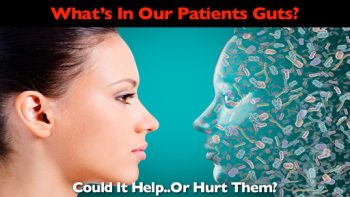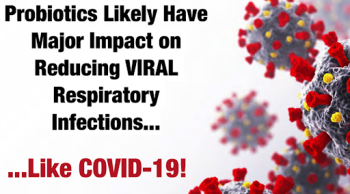Scroll down for recording access sign-up
Our Latest Informative Hot-Topic Webinar!
We Just Don’t Have A Name Yet!
If You Want Answers…
- Can we change the microbiome to cure disease?
- What happens to the microbiome in critically ill patients?
- Should we be moving from combating single microbe disease to developing the microbiome system as a whole?
- Is symbiotic the new “it” intervention?
- Are stool transplants our future?
Then, This Webinar is for You!
Harness The Amazing Power of the Microbiome!
The human body is a unique ecosystem made up of human and microbial cells; in fact, microbial cells outnumber human cells in the body, and these microbes (microbiota) play a critical role in human health and disease. Undoubtedly, one of the most exciting scientific advances in recent years has been the realization that our bacterial symbionts or commensal microorganisms (our microbiome) play essential roles in our physiology as humans in a range of functions including nutritional state, vitamin synthesis, drug metabolism, protection against infection, and recovery from illness.

A surprising finding is that disruption of the homeostasis of the commensal bacteria, known as “dysbiosis,” may be as vital as host genetics in the development of a range of diseases such as inflammatory bowel disease, obesity, diabetes, neurologic or mental illness, cardiovascular disease, and as recently shown, critical illness. This suggests that we may be able to predict risk for disease and prevent or even cure disease by regulating the bacteria that live on and within us.
This is Just What You Need to Know to Move the Needle in Your Practice!
Very recent advances in microbiome-sequencing methods have resulted in unprecedented growth in understanding this vital and dynamic part of what makes us human. This new discovery raises the question of whether restoration of a healthy microbiome via probiotics or synbiotics (probiotic and prebiotic combinations) to intervene in the ubiquitous disruption of our healthy microbiome by the environment created by poor diet, antibiotic exposure, and chronic or acute illness would be an optimal intervention in preventing and/or treating illness.
 In this lecture, we’ll discuss the importance of the rapidly growing role and understanding of the microbiome in health and disease. Additionally, we’ll examine a range of examples where the use of microbiome interventions including probiotics, fecal microbial transplants (FMT), and prebiotics are gaining data for clinical utility in improving outcomes in a range of illnesses and illness prevention.
In this lecture, we’ll discuss the importance of the rapidly growing role and understanding of the microbiome in health and disease. Additionally, we’ll examine a range of examples where the use of microbiome interventions including probiotics, fecal microbial transplants (FMT), and prebiotics are gaining data for clinical utility in improving outcomes in a range of illnesses and illness prevention.
Learning Objectives:
By attending this webinar, learners will…
- Discuss and understand new techniques in evaluating the microbiome and the role our microbial/bacterial partners play in health and disease
- Discuss and understand new data for the role of probiotics and fecal microbial transplant in representative key clinical challenges such as respiratory illness, critical illness, and Clostridium Difficile.
- Discuss and Understand the role of probiotics and other potential “microbiome” interventions in disease prevention such as respiratory infections, COVID-19, and their potential role as “psychobiotics” in affecting psychiatric conditions.
This webinar will be recorded with limited-time access for registrants.
All webinar participants will receive a certificate of completion for 1.5 hours of continuing education.
Note: We have had issues with GoToWebinar invitations being blocked by AOL in the past.
To resolve this, we strongly suggest that you use a Gmail address to register in the future,
as Gmail doesn’t block GTW invitations.
Once your order is complete, the webinar access link will appear on your screen
Susan Allen RDN, LDN, FMNS Hosts….

Paul E. Wischmeyer, MD, EDIC, FCCM, FASPEN
Your Microbiome Expert Direct From the Trenches!
Paul E. Wischmeyer is a critical care, perioperative, and nutrition physician who serves as a Tenured Professor of Anesthesiology and Surgery at Duke University School of Medicine. He also serves as the Associate Vice Chair for Clinical Research in the Dept. of Anesthesiology & Director of the Nutrition Team at Duke Hospital. Finally, he is the founder and Director of the Duke Clinical Nutrition Fellowship.
Dr. Wischmeyer’s clinical and research focus is focused helping patients prepare and recover from critical illness and surgery. His research interests include surgical and ICU nutrition and exercise rehabilitation therapy, parenteral nutrition and personalized nutrition trials, perioperative optimization, post-illness muscle mass and functional recovery, and role of probiotics/microbiome in illness.
Dr. Wischmeyer has received significant funding from National Institutes of Health and Department of Defense. He has received numerous awards for his work from national and international societies, including the Jeffrey Silverstein Award and Memorial Lecture for Humanism in Medicine from the American Delirium Society, the John M. Kinney Award for the most significant contribution to the field of general nutrition, and the Stanley Dudrick Research Scholar Award of the American Society for Parenteral and Enteral Nutrition (ASPEN).
In 2020, he received the ASPEN George Blackburn Clinical Nutrition Mentorship Award, as well as the Excellence in Nutrition Support Education Award from ASPEN. He has over 210 publications (H index-74 and >50 papers with >100 citations and one paper with >1000 citations) in nutrition, critical care, exercise, muscle, metabolism, probiotics/microbiome, and perioperative care, including publications in the New England Journal of Medicine.
Dr. Wischmeyer has been an invited speaker at numerous national/international medical meetings, delivering over 1000 invited presentations in his career. Finally, he is an advocate and lecturer for improving the patient experience and teaching providers to keep CARE as the focus of healthcare.


